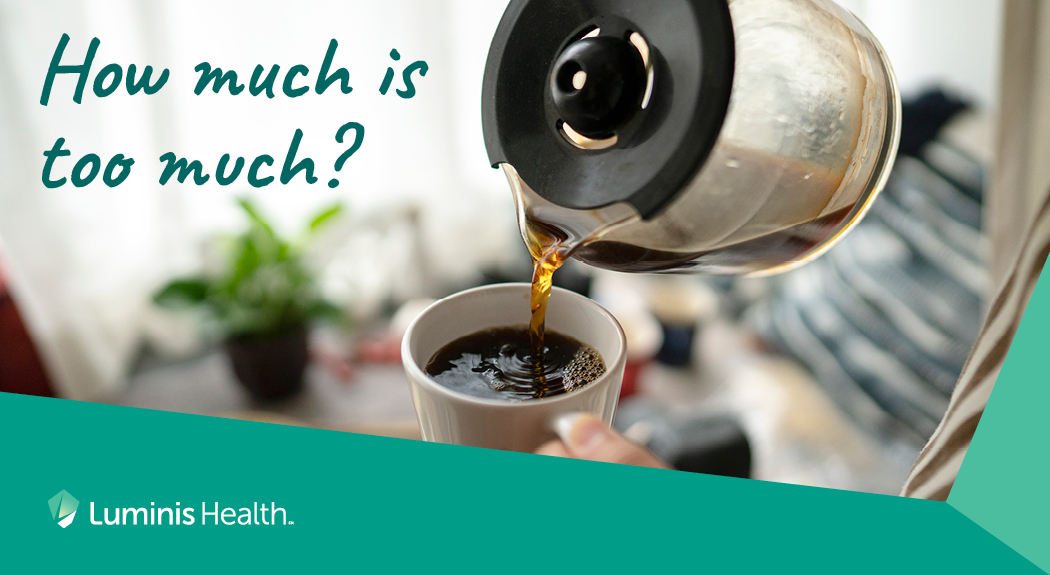
Whether it’s coffee to start the day, a cold soda to revive the afternoon, or a beloved pumpkin spice latte to embrace the season, caffeine is a popular pick-me-up for many. However, while these caffeinated drinks can provide a much-needed boost, excessive consumption can have negative effects on your health. In rare instances, it can even be fatal. That’s why it’s important to know the facts.
What is caffeine?
Caffeine is a naturally occurring stimulant that affects your central nervous system, helping you feel more awake and alert. It’s found in coffee beans, tea leaves, kola nuts, yerba mate, guarana berry, and cacao beans.
Safe limit for caffeine: How much is too much?
According to the U.S. Food and Drug Administration, most healthy adults can consume 400 milligrams of caffeine a day without any dangerous or negative health effects. If you are pregnant, the American College of Obstetricians and Gynecologists suggests keeping your caffeine intake below 200 milligrams a day.
The amount of caffeine in beverages can vary greatly, making it easy to consume too much caffeine. Here are some typical caffeine ranges for beverages:
- An 8-ounce cup of coffee has between 80 to 100 milligrams of caffeine.
- An 8-ounce cup of green or black tea has between 30 to 50 milligrams.
- A 12-ounce/regular-size can of caffeinated soda has between 30 to 46 milligrams.
- An 8-ounce energy drink has between 40 to 300 milligrams. Many energy drinks only come in 12-ounce or 16-ounce cans that can contain up to 400 milligrams of caffeine—the safe daily limit.
When adding up your caffeine intake for the day, make sure you include all caffeine sources. Caffeine can also be found in chocolate and baked goods, like cookies. It’s even in some medications, such as those for headaches. And decaffeinated coffees and teas may still contain between two to 15 milligrams of caffeine. Whenever possible, read all package labels to see how much caffeine a product contains.
Side effects of too much caffeine
Side effects that you have had too much caffeine include:
- Agitation or irritability.
- Fast heart rate.
- Feeling anxious or restless.
- Increased urination, which can lead to dehydration.
- Insomnia or trouble falling asleep or staying asleep.
- Muscle twitches, such as eye twitches.
- Nausea or upset stomach.
Can you overdose on caffeine?
Consuming around 1,200 mg of caffeine at one time can cause toxic effects on your health, according to the FDA.
While rare, it is possible to overdose on caffeine, which can lead to death. Severe side effects of too much caffeine include:
- Cardiac arrest.
- Disorientation.
- Hallucination or psychosis.
- Irregular heartbeat.
- Muscle breakdown, called rhabdomyolysis.
- Seizures.
The overdose risk increases if you use dietary liquid or powdered caffeine supplements, which often contain high concentrations of caffeine. For example, just one teaspoon of powdered caffeine has the same amount of caffeine as 28 cups of coffee.
Why you should space out your caffeine intake
When you consume caffeine, it takes 45 to 60 minutes before you start to feel it. The stimulant effects can last between three to five hours.
Consuming too much caffeine all at once or having caffeinated products too close together in your day can lead to bothersome and dangerous side effects. Remember, limit your caffeine intake to 400 mg a day. And when possible, space out your caffeine intake by three to five hours, to reduce the risk of side effects.
To keep caffeine from interrupting your sleep, the American Academy of Sleep Medicine recommends avoiding caffeine at least six hours before bedtime. So, if you go to bed at 10 p.m., stop consuming caffeine by 4 p.m.
Who should avoid caffeine?
Some medical conditions may make it more likely to have side effects from caffeine. Talk to your doctor about what amount of caffeine is safe for you if you have:
- Cardiovascular disease, especially irregular heartbeat.
- High blood pressure.
- Severe anxiety.
- Peptic ulcer disease or gastroesophageal reflux disease (GERD).
- Liver or kidney disease.
- Seizures.
The bottom line on caffeine
Different people can experience the effects of caffeine differently. If you experience side effects from caffeine, see the specialist team at Luminis Health. They can help figure out why you may be more sensitive to caffeine.

Waseem Hussain, MD,is Associate Regional Director of Primary Care at Luminis Health who has expertise in all areas of family medicine including intense management of neurologic, pulmonary and cardiac diseases as well as diabetes and gynecologic care.



